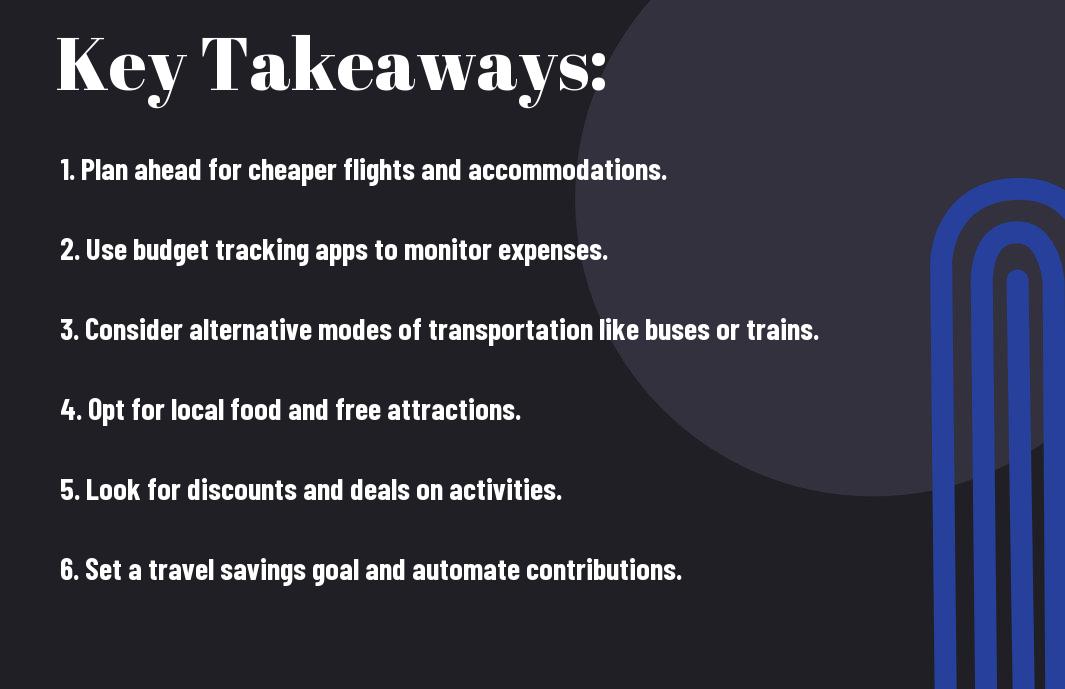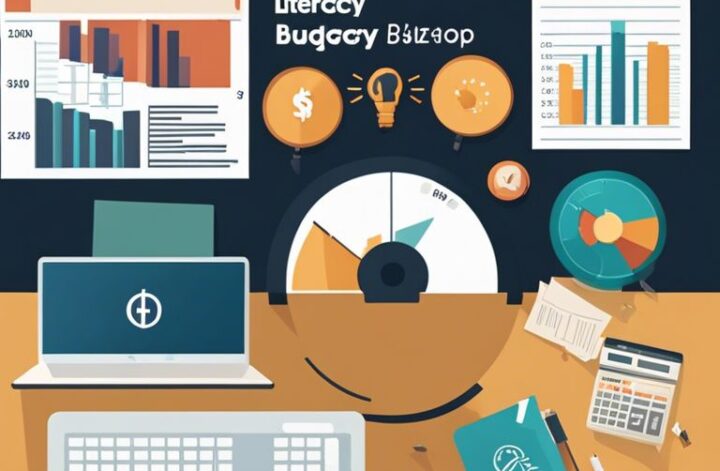Budgeting for travel can often seem like an overwhelming task, especially for young professionals eager to satisfy their wanderlust without breaking the bank. However, with the right strategies in place, it is entirely possible to plan and save for exciting adventures without compromising on experiences. In this blog post, we will explore practical and effective tips for budgeting and saving specifically for travel, allowing you to indulge in your passion for exploration while maintaining financial stability.

Key Takeaways:
- Set a travel savings goal: Determine how much money you need for your desired trip and create a savings plan to reach that goal.
- Create a separate travel fund: Open a separate savings account specifically for travel expenses to avoid spending that money on other things.
- Cut down on daily expenses: Identify areas where you can cut back on spending, such as dining out less, brewing your own coffee, or canceling subscription services.
- Utilize travel rewards programs: Sign up for travel rewards credit cards or loyalty programs to earn points and miles that can help offset the cost of flights, accommodation, and activities.
- Be flexible with travel dates and destinations: Travel during off-peak seasons, consider alternative destinations, and be open to last-minute deals to find affordable options for your wanderlust adventures.

Setting Travel Goals
Some Unlock the Secrets to Affordable Summer Wanderlust and dream of traveling to exotic destinations across the globe. However, it’s important to set realistic travel goals that align with your budget and savings plan. Start by outlining your travel aspirations and determining what experiences are a priority for you.
Deciding on Destinations: Dream vs. Reality
Destinations play a crucial role in shaping your travel budget. While dreaming of luxurious vacations in far-off lands is exhilarating, it’s important to consider the practicality of those destinations in relation to your budget. Research affordable alternatives and hidden gems that offer unique experiences without breaking the bank. By striking a balance between dream destinations and budget-friendly options, you can satisfy your wanderlust without compromising your financial goals.
Short-term vs. Long-term Travel Planning
Travel planning can vary depending on whether you’re initiateing on short-term trips or saving for long-term travel adventures. Short-term travel planning may involve setting aside a portion of your monthly budget for weekend getaways or quick escapes. On the other hand, long-term travel planning requires a more structured approach, including setting specific savings goals and creating a dedicated travel fund. To effectively budget for both short-term and long-term travel, consider prioritizing experiences that align with your overall travel goals while staying within your financial means.
Creating a Travel Budget
Calculating Expected Expenses
If you’re a young professional with a travel bug, it’s necessary to start by calculating your expected expenses for the trip. Begin by researching the cost of accommodation, transportation, meals, activities, and any other potential expenditures. Consider the destination’s average daily expenses and factor in any additional costs like travel insurance or visas. By having a clear understanding of how much you need to save, you can set a realistic budget and avoid overspending.
Prioritizing Budget Allocations
To ensure that you can afford your dream vacation without breaking the bank, it’s crucial to prioritize your budget allocations. Take a closer look at your current spending habits and identify areas where you can cut back to save for travel. Consider setting up a separate travel fund and automating regular contributions to it. By making travel a financial priority, you’ll be able to save more efficiently and be one step closer to satisfying your wanderlust.
Travel budgeting requires careful planning and discipline, but with the right strategies in place, you can make your travel dreams a reality without compromising your financial stability. By calculating your expected expenses and prioritizing budget allocations, you’ll be well-equipped to budget and save for your next adventure.
Saving Strategies for Travel Funds
Automating Savings
Keep your wanderlust dreams alive by automating your savings for travel expenses. Setting up automatic transfers from your checking account to a dedicated travel fund can be a game-changer for young professionals looking to prioritize travel without breaking the bank. By consistently saving a portion of your income, you can steadily build up your travel fund over time. Consider setting up a separate savings account specifically for travel to help you easily track your progress and avoid the temptation of dipping into those funds for other expenses.
Identifying and Cutting Unnecessary Expenses
Funds for travel can be freed up by identifying and cutting unnecessary expenses in your daily life. Take a close look at your spending habits and identify areas where you can cut back. For example, dining out less frequently, canceling unused subscriptions, or opting for homemade coffee instead of daily trips to expensive cafés can all add up to significant savings that can be redirected towards your travel fund. By making small lifestyle adjustments, you’ll be surprised at how quickly your travel savings can grow.
Another effective strategy for cutting unnecessary expenses is to create a budget and stick to it religiously. Tracking your expenses and setting limits for different categories can help you see where your money is going and identify areas where you can cut back. Be diligent about following your budget and avoid impulse purchases that can derail your savings goals. With a little discipline and conscious spending habits, you’ll be well on your way to funding your next travel adventure without breaking the bank.
Travel Hacks and Tips
Unlike popular belief, traveling doesn’t always have to come with a hefty price tag. With some strategic planning and savvy money-saving tips, you can satisfy your wanderlust without breaking the bank. Knowing how to budget and save specifically for travel can make all the difference in making your dream trips a reality. For more in-depth insights on budget-friendly travel strategies, check out How I Afford to Travel on a Budget.
Best Times to Book Flights and Accommodations
For budget-conscious travelers, timing is everything when it comes to booking flights and accommodations. By being flexible with your travel dates and taking advantage of off-peak seasons, you can score significant savings on airfare and hotel rates. Research shows that booking flights on Tuesdays and Wednesdays tends to offer the best deals, as airlines often release discounted fares during these mid-week days. Similarly, booking accommodations well in advance or opting for last-minute deals can also result in substantial savings.
Utilizing Travel Rewards and Credit Cards
Cards with travel rewards and benefits can be valuable tools for budget travelers looking to maximize their savings. By signing up for a travel rewards credit card, you can earn points or miles for every dollar spent on eligible purchases, which can be redeemed for free flights, hotel stays, or other travel perks. Additionally, some credit cards offer special sign-up bonuses and benefits like complimentary airport lounge access, travel insurance, and no foreign transaction fees. It’s crucial to compare different card offerings and choose one that aligns with your travel goals and spending habits to make the most of these rewards.
By strategically planning your travel bookings, utilizing rewards programs, and taking advantage of money-saving tips, young professionals can commence on their wanderlust adventures without emptying their wallets. With some research and smart financial decisions, you can make your travel dreams a reality without sacrificing your budget.
Earning Extra Income for Travel
Now, let’s talk about ways to earn some extra cash to fuel your travel adventures. Taking on side gigs and freelance work can be a great way to supplement your income and reach your savings goals faster. Whether it’s picking up a few shifts at a local restaurant, offering your skills as a freelance writer or designer, or signing up for a gig economy platform like TaskRabbit or Fiverr, there are plenty of opportunities to earn money on the side.
Taking on Side Gigs and Freelance Work
To maximize your earning potential, consider leveraging your existing skills or hobbies to find freelance work that aligns with your interests. Websites like Upwork and Freelancer are great platforms to showcase your talents and connect with potential clients. By investing some time and effort into building your freelance profile and portfolio, you can secure projects that not only help you save for travel but also allow you to do what you love.
Selling Unused Items
Freelance work is not the only way to earn extra income for travel. Selling unused items around your home can also generate some quick cash. Take a look at your closet, garage, or bookshelf and identify items that you no longer use or need. Platforms like eBay, Craigslist, or Facebook Marketplace make it easy to list and sell these items to a wider audience. By decluttering your space and turning unused belongings into cash, you’ll not only pad your travel fund but also create a more minimalist and organized living environment.
Smart Spending During the Trip
Despite being on a budget, it’s crucial to manage your daily spending wisely while traveling. Referencing resources like Our Top Tips for First-Time Travelers on a Budget can provide valuable insights on how to stretch your travel funds without sacrificing experiences.
Daily Budget Management
Trip the urge to splurge on unnecessary items and set a daily spending limit. Keep track of your expenses using a budgeting app or a simple notebook to ensure you stay within your allocated budget. Consider opting for public transportation or walking instead of expensive taxis, and look for free or low-cost activities to fill your days.
Choosing Budget-Friendly Activities and Dining
Smartly selecting budget-friendly activities and dining options can significantly impact your overall travel expenses. Prioritize free attractions, such as museums on certain days with free admission, walking tours, or exploring local markets. When dining out, opt for street food or local eateries over tourist traps. Plus, consider purchasing groceries for simple meals or snacks to cut down on food costs.
Post-Travel Financial Management
Assessing Financial Status Post-Trip
For young professionals who have just returned from a fulfilling travel adventure, it’s important to assess their financial status to ensure they are still on track with their savings goals. Take a moment to review your spending during the trip and compare it to your initial budget. Identify any areas where you may have overspent and reflect on ways to improve for future travels. Use this opportunity to recalibrate your budget and savings plan to maintain financial stability.
Planning for Future Travels
On the heels of a successful trip, it’s crucial to start planning for future adventures while maintaining financial responsibility. An effective strategy is to set specific savings goals for upcoming trips based on your travel desires and budget constraints. Allocate a portion of your monthly income towards a dedicated travel fund to ensure you have the financial resources to satisfy your wanderlust without breaking the bank. Consider researching cost-effective travel options, such as off-peak season travel or budget accommodations, to make the most of your travel budget.
Assessing your financial status post-trip and planning for future travels are vital components of post-travel financial management. By staying proactive and mindful of your spending habits, you can continue to prioritize travel experiences while maintaining financial stability and long-term savings goals.

Resources and Tools
Budgeting Apps and Financial Software
For many young professionals, utilizing budgeting apps and financial software can be a game-changer when it comes to saving for travel. These tools help track expenses, set savings goals, and create budgets tailored to individual spending habits. Popular apps like Mint, YNAB (You Need a Budget), and PocketGuard offer features such as expense categorization, goal-setting, and bill reminders to keep finances in check. By using these tools consistently, travelers can ensure they are staying on track with their savings goals and making the most of their travel budget.
Websites and Forums for Discounted Travel Deals
For those looking to snag discounted travel deals, websites and forums dedicated to budget-friendly travel are invaluable resources. Websites like Skyscanner, Hopper, and Kayak offer tools to compare flight prices, find the best deals, and track fare trends. Meanwhile, forums like TravelZoo, FlyerTalk, and Reddit’s r/traveldeals are goldmines for insider tips, error fares, and limited-time promotions. By staying active on these platforms and keeping an eye out for deals, travelers can score significant savings on flights, accommodations, and activities for their next adventure.
It is necessary to bookmark these websites and regularly check forums for the latest deals, as discounts may be time-sensitive and require quick action to secure the best rates. By combining the power of technology with insider knowledge from fellow travelers, budget-conscious wanderers can maximize their travel experiences while minimizing costs.

Final Words
The key to satisfying your wanderlust without breaking the bank lies in careful budgeting and saving strategies tailored specifically for travel. By setting a clear travel goal, creating a dedicated travel fund, and tracking expenses diligently, young professionals can prioritize their travel desires while still being financially responsible. Remember to take advantage of deals and discounts, plan ahead to snag the best prices on flights and accommodations, and consider alternative accommodations like hostels or rental platforms to stretch your travel budget even further. Through mindful planning and smart financial decisions, wanderlust can be fulfilled without sacrificing financial health.
Overall, by implementing these budget-friendly tips and incorporating saving habits into your lifestyle, you can initiate on your travel adventures with confidence and excitement, knowing that you have the financial resources to support your wanderlust. Traveling on a budget is not about limiting experiences; rather, it is about being resourceful and intentional with your finances, allowing you to explore the world while staying within your means. With the right mindset and strategies in place, young professionals can make their travel dreams a reality without compromising on financial stability.




